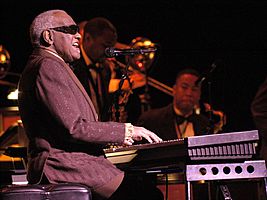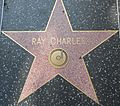Ray Charles facts for kids
Quick facts for kids
Ray Charles
|
|
|---|---|

Ray Charles at his last concert
|
|
| Background information | |
| Birth name | Ray Charles Robinson |
| Born | September 23, 1930 Albany, Georgia, United States |
| Origin | Greenville, Florida, United States |
| Died | June 10, 2004 (aged 73) Beverly Hills, California, United States |
| Genres | R&B, soul, blues, jazz, gospel |
| Occupation(s) | Singer, songwriter, musician |
| Instruments | Singing, piano, alto saxophone |
| Years active | 1947–2004 |
| Labels | Atlantic, ABC, Warner Bros. Records |
Ray Charles Robinson (September 23, 1930 – June 10, 2004) was an American singer, songwriter, and pianist and is regarded as one of the most iconic and influential singers in history, and was often referred to by contemporaries as "The Genius". He liked when friends and fellow musicians called him "Brother Ray". Charles was blinded during childhood, possibly due to glaucoma.
Charles pioneered the soul music genre during the 1950s. He combined blues, jazz, rhythm and blues, and gospel styles into the music he recorded for Atlantic Records. While he was with ABC, Charles became one of the first black musicians to be granted artistic control by a mainstream record company.
Charles's 1960 hit "Georgia On My Mind" was the first of his three career No. 1 hits on the Billboard Hot 100.
Charles cited Nat King Cole as a primary influence, but his music was also influenced by Louis Jordan and Charles Brown. Frank Sinatra called Ray Charles "the only true genius in show business," although Charles downplayed this notion. Billy Joel said, "This may sound like sacrilege, but I think Ray Charles was more important than Elvis Presley".
For his musical contributions, Charles received the Kennedy Center Honors, the National Medal of Arts, and the Polar Music Prize. He was one of the inaugural inductees at the Rock and Roll Hall of Fame in 1986. He has won 18 Grammy Awards (5 posthumously), the Grammy Lifetime Achievement Award in 1987, and 10 of his recordings have been inducted into the Grammy Hall of Fame. Rolling Stone ranked Charles No. 10 on their list of the 100 Greatest Artists of All Time, and No. 2 on their list of the 100 Greatest Singers of All Time. In 2022, he was inducted into the Country Music Hall of Fame, as well as the Black Music & Entertainment Walk of Fame.
Contents
Early life and education
Ray Charles Robinson was born on September 23, 1930, in Albany, Georgia. He was the son of Bailey Robinson, a laborer, and Aretha (or Reatha) Robinson (née Williams), a laundress, of Greenville, Florida.
Charles was deeply devoted to his mother and later recalled her perseverance, self-sufficiency, and pride as guiding lights in his life.
In his early years, Charles showed an interest in mechanical objects and would often watch his neighbors working on their cars and farm machinery. His musical curiosity was sparked at Wylie Pitman's Red Wing Cafe, at the age of three, when Pitman played boogie woogie on an old upright piano; Pitman subsequently taught Charles how to play the piano. Charles and his mother were always welcome at the Red Wing Cafe and even lived there when they were in financial distress. Pitman would also care for Ray's younger brother George, to take some of the burden off their mother. George accidentally drowned when he was four years old.
Charles started to lose his sight at the age of four or five, and was blind by the age of seven, likely as a result of glaucoma. Aretha Robinson used her connections in the local community to find a school that would accept a blind African-American pupil. Despite his initial protest, Charles attended school at the Florida School for the Deaf and the Blind in St. Augustine from 1937 to 1945.
Charles further developed his musical talent at school and was taught to play the classical piano music of Bach, Mozart and Beethoven. His teacher, Mrs. Lawrence, taught him how to use braille music, a difficult process that requires learning the left hand movements by reading braille with the right hand and learning the right hand movements by reading braille with the left hand, then combining the two parts.
Charles's mother died in the spring of 1945, when he was 14. Her death came as a shock to him; he later said the deaths of his brother and mother were "the two great tragedies" of his life. Charles decided not to return to school after the funeral.
Relationships and children
Charles was married twice. His first marriage to Eileen Williams lasted from July 31, 1951, until 1952, his second (to Della Beatrice Howard Robinson, called "Bea" by Charles) lasted 22 years. Throughout his life Charles had many relationships with women with whom he fathered a dozen children.
Charles held a family luncheon for his twelve children in 2002, ten of whom attended. He told them he was mortally ill and $500,000 had been placed in trusts for each of the children to be paid out over the next five years.
Chess hobby
Charles enjoyed playing chess. When questioned if people try to cheat against a blind man, he joked in reply, "You can't cheat in Chess... I'm gonna see that!" In 2002, he played and lost to the American grandmaster and former U.S. champion Larry Evans.
Death
He died at his home in Beverly Hills, California, of complications resulting from liver failure, on June 10, 2004, at the age of 73. His funeral took place on June 18, 2004, at the First African Methodist Episcopal Church of Los Angeles, with numerous musical figures in attendance. B.B. King, Glen Campbell, Stevie Wonder and Wynton Marsalis each played a tribute at the funeral. He was interred in the Inglewood Park Cemetery.
Singles
- "Roll with Me Baby" (1952)
- "The Sun's Gonna Shine Again" (1953)
- "Feelin' Sad" (1953)
- "It Should've Been Me" (1954)
- "Don't You Know" (1954)
- "I've Got a Woman" (1954)
- "Come Back" (1954)
- "This Little Girl of Mine" (1955)
- "A Fool for You" (1955)
- "Blackjack (song)" (1955)
- "Greenbacks" (1955)
- "Drown in My Own Tears" (1956)
- "Mary Ann" (1956)
- "Hallelujah I Love Her So" (1956)
- "What Would I Do Without You" (1956)
- "Lonely Avenue" (1956)
- "Ain't That Love" (1957)
- "It's All Right" (1957)
- "Swanee River Rock" (1957)
- "Talkin' 'bout You" (1958)
- "Yes Indeed" (1958)
- "My Bonnie" (1958)
- "Rockhouse" (Part 2) (1958)
- "Night Time Is the Right Time" (1959)
- "That's Enough" (1959)
- "What'd I Say (Part 1)" (1959)
- "I'm Movin' On" (1959)
- "Let the Good Times Roll" (1960)
- "Don't Let the Sun Catch You Cryin'" (1960)
- "Just for a Thrill" (1960)
- "Tell the Truth" (1960)
- "Come Rain or Come Shine" (1960)
- "Doodlin' (Part 1)" (1960)
- "My Baby! (I Love Her, Yes I Do)" (1960)
- "Sticks and Stones" (1960)
- "Georgia on My Mind" (1960)
- "Ruby (song)" (1960)
- "Hardhearted Hannah" (1960)
- "Them That Got" (1960)
- "Early in the Mornin'" (1961)
- "Am I Blue" (1961)
- "Hard Times (No One Knows Better Than I)" (1961)
- "One Mint Julep" (1961)
- "I've Got News for You" (1961)
- "I'm Gonna Move to the Outskirts of Town" (1961)
- "Hit the Road Jack" (1961)
- "Unchain My Heart" (1961)
- "But on the Other Hand Baby" (1961)
- "Baby, It's Cold Outside" (1962)
- "Hide Nor Hair" (1962)
- "At the Club" (1962)
- "I Can't Stop Loving You" (1962)
- "Born to Lose" (1962)
- "You Don't Know Me" (1962)
- "Careless Love" (1962)
- "You Are My Sunshine" (1962)
- "Your Cheatin' Heart" (1962)
- "Feelin' Sad" (1963)
- "Don't Set Me Free" (1963)
- "The Brightest Smile in Town" (1963)
- "Take These Chains from My Heart" (1963)
- "No Letter Today" (1963)
- "No One" (1963)
- "Without Love (There Is Nothing)" (1963)
- "Busted (song)" (1963)
- "Making Believe" (1963)
- "Talkin' 'bout You" (1964)
- "That Lucky Old Sun" (1964)
- "My Heart Cries for You" (1964)
- "Baby, Don't You Cry" (1964)
- "My Baby Don't Dig Me" (1964)
- "A Tear Fell" (1964)
- "No One to Cry To" (1964)
- "Smack Dab in the Middle" (1964)
Since 1965
- "Makin' Whoopee" (1965)
- "Cry (song)" (1965)
- "Teardrops from My Eyes" (1965)
- "I Gotta Woman" (Part One)(1965)
- "Without a Song" (Part 1)(1965)
- "I'm a Fool to Care" (1965)
- "The Cincinnati Kid (song)" (1965)
- "Crying Time" (1966)
- "Together Again" (1966)
- "You're Just About to Lose Your Clown" (1966)
- "I Chose to Sing the Blues" (1966)
- "Please Say You're Fooling" (1966)
- "I Don't Need No Doctor" (1966)
- "I Want to Talk About You" (1967)
- "Something Inside Me" (1967)
- "Here We Go Again" (1967)
- "Somebody Ought to Write a Book About It" (1967)
- "In the Heat of the Night" (1967)
- "Yesterday" (1967)
- "Come Rain or Come Shine" (Published again)(1968)
- "That's a Lie" (1968)
- "Eleanor Rigby" (1968)
- "Understanding" (1968)
- "Sweet Young Thing Like You" (1968)
- "Listen, They're Playing My Song" (1968)
- "If It Wasn't for Bad Luck" (1969)
- "When I Stop Dreaming" (1969)
- "I Didn't Know What Time It Was" (1969)
- "Let Me Love You" (1969)
- "We Can Make It" (1969)
- "Claudie Mae" (1970)
- "Laughin and Clownin" (1970)
- "If You Were Mine" (1970)
- "Don't Change on Me" (1971)
- "Sweet Memories" (1971)
- "Booty Butt" (1971)
- "Feel So Bad" (1971)
- "What Am I Living For" (1972)
- "Look What They've Done to My Song, Ma" (1972)
- "Hey Mister" (1972)
- "I Can Make It Thru the Days (But Oh Those Lonely Nights)" (1973)
- "Come Live with Me" (1973)
- "Louise" (1974)
- "Living for the City" (1975)
- "America the Beautiful" (1976)
- "I Can See Clearly Now" (1977)
- "Game Number Nine" (1978)
- "Ridin' Thumb" (1978)
- "Some Enchanted Evening (song)" (1979)
- "Just Because" (1979)
- "Compared to What" (1980)
Images for kids
-
Star honoring Charles on the Hollywood Walk of Fame, at 6777 Hollywood Boulevard
See also
 In Spanish: Ray Charles para niños
In Spanish: Ray Charles para niños




